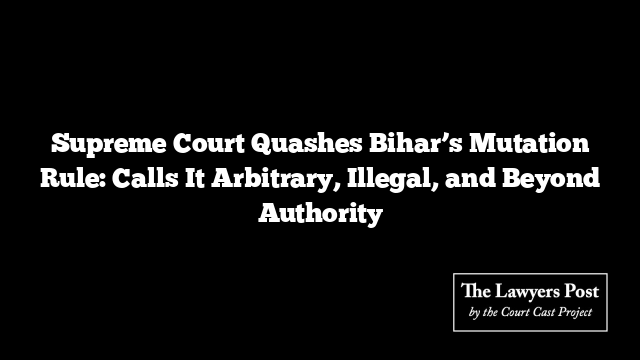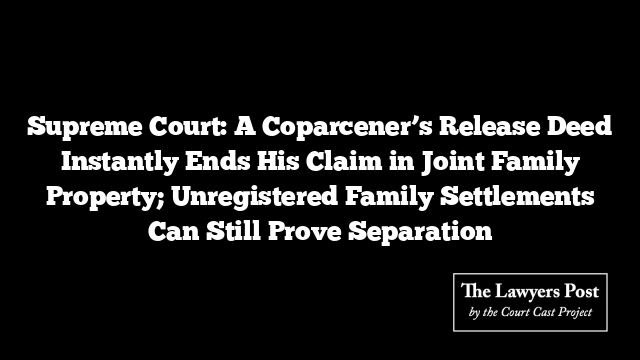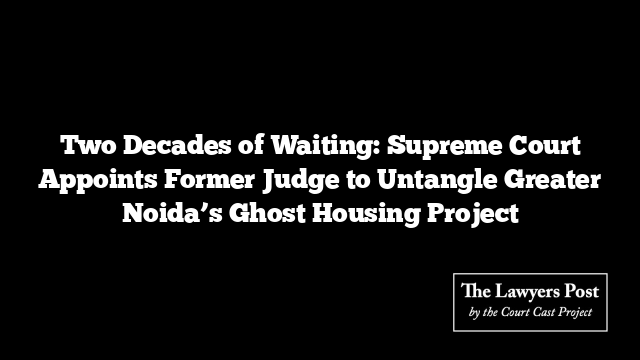In a powerful rebuke to bureaucratic overreach, the Supreme Court has struck down two controversial provisions of the Bihar Registration Rules, 2008 — sub-rules (xvii) and (xviii) of Rule 19 — that allowed registering authorities to deny registration of sale or gift deeds unless sellers produced proof of land mutation.
A Bench comprising Justice Pamidighantam Sri Narasimha and Justice Joymalya Bagchi declared the 2019 amendment introducing these sub-rules ultra vires the Registration Act, 1908, calling them an “arbitrary restriction” on a citizen’s constitutional right to acquire and dispose of property.
The Court held that the requirement forced landowners to provide collateral evidence of ownership that went beyond the scope of the Registration Act. “The impugned sub-rules shift the balance of power and impose an impractical pre-condition for registration,” the Bench observed. It further noted that Bihar’s mutation and survey processes under the 2011 Acts remain incomplete, making compliance “virtually impossible.”
Freedom To Transfer Property Cannot Be Choked
The Bench said the mandatory submission of “Jamabandi” or “holding allotment” certificates before registration effectively throttled the freedom to sell property. “Any rule or law that hinders the free and effective transfer of property amounts to a deprivation of property,” the Court stated, adding that unreasonable procedural barriers cannot be allowed to obstruct legitimate transactions.
Given that the mutation process in Bihar is yet to be fully implemented, the judges concluded that the rules were both arbitrary and illegal.
Rule-Making Power Misused
Turning to the source of authority, the Court made it clear that the Inspector General of Registration exceeded the powers granted under Section 69 of the Registration Act. That provision, the Bench said, only allows the framing of rules related to record maintenance and procedural management—not the imposition of new substantive conditions like proof of mutation.
“There is nothing in Section 69 authorizing the Inspector General to demand proof of mutation in favour of the vendor as a condition precedent for registration,” the Court emphasized, rejecting the Patna High Court’s earlier endorsement of the rule under the guise of general powers.
Registration Does Not Equal Ownership
The judgment delved into a long-standing gap in India’s property law framework — the difference between registration and ownership. Registration, the Court explained, is only a record of transaction, not conclusive proof of ownership. “It has presumptive evidentiary value, but it does not establish title,” the Bench noted.
Highlighting that nearly two-thirds of civil litigation in India stems from property disputes, the Court remarked that the nation’s presumptive titling system urgently requires reform.
Call for Reform and Technological Overhaul
The Bench urged a structural reimagining of India’s property registration laws, suggesting integration of Blockchain technology to ensure transparency and prevent tampering of ownership records. “Blockchain can fortify title integrity and enhance public confidence,” the Court observed, advocating a shift towards a conclusive titling system—where registration itself confirms ownership.
To that end, the Court directed the Law Commission of India to examine legislative and technological pathways to integrate property registration and ownership verification, and to work with the Union and State Governments in charting reforms to the Transfer of Property Act, the Registration Act, and related laws.
With this ruling, the Supreme Court not only dismantled Bihar’s restrictive rule but also reignited a long-overdue national conversation on modernizing India’s land ownership and registration systems.





